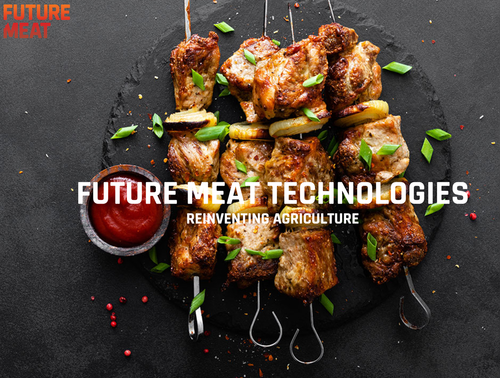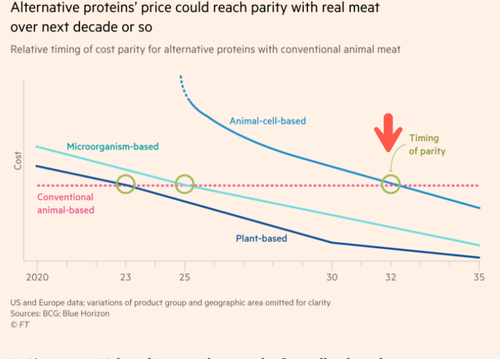When Will Lab-Grown Meat Become Cheap Enough To Buy?
Lab-grown meat consumes less energy and water and emits significantly fewer greenhouse gases than farm-raised meat. Bioengineering meat products in labs are part of the new food supply chain that we’re all going to eat after the global green reset is over.
Dozens of start-ups have been making cultured or in vitro meats for a number of years. Production costs are expensive and are about a decade away from parity with traditional meat prices.
Israeli start-up Future Meat, whose backers include Archer Daniels Midland, Tyson Foods, and S2G, has halved production costs in just a few months for its lab-grown chicken – a big move towards commercial viability, according to Financial Times.
Future meat can produce a 110-gram chicken breast for just under $4, down from $7.50 announced at the start of the year.
Rom Kshuk, the chief executive, expects the piece of meat could fall below $2 in the next 12-18 months.
There are more than 50 companies worldwide working on getting lab-grown meat into supermarkets. Kshuk said his company is focused on obtaining regulatory approval for commercialization from the USDA and the FDA in 2022.
“We will launch a product in the US market in the next 18 months that will have a commercially viable price,” he told FT.
From chicken nuggets to lobster, companies are working towards a more sustainable approach for future food.
There’s also been a push for plant-based meat and an increasing acceptance of plant-based products. This could be great news for lab-grown meat as it appears global elites want to crush livestock farming because they believe it significantly contributes to greenhouse emissions.
So the question we are all asking ourselves – when does lab-grown meat become commercially viable where the average consumer can afford it? According to FT, sometime in the early 2030s.
It’s becoming more evident how the global reset and elites behind it are restructuring the global economy towards their eventual goals of a net-zero carbon emissions economy by the 2040-2060 timeframe.
… but like anything spewing from government or the non-elected officials who attempt to dictate the future – they’re often wrong in timing or the outcome as a whole.
Tyler Durden
Fri, 05/07/2021 – 23:20
via ZeroHedge News https://ift.tt/3tuwG6y Tyler Durden

